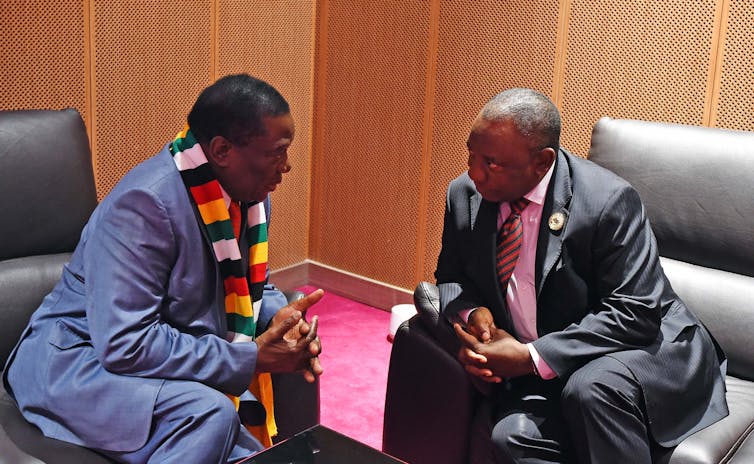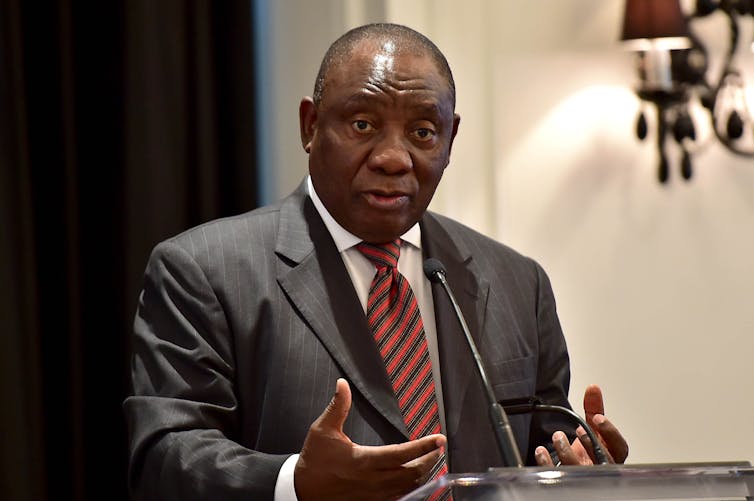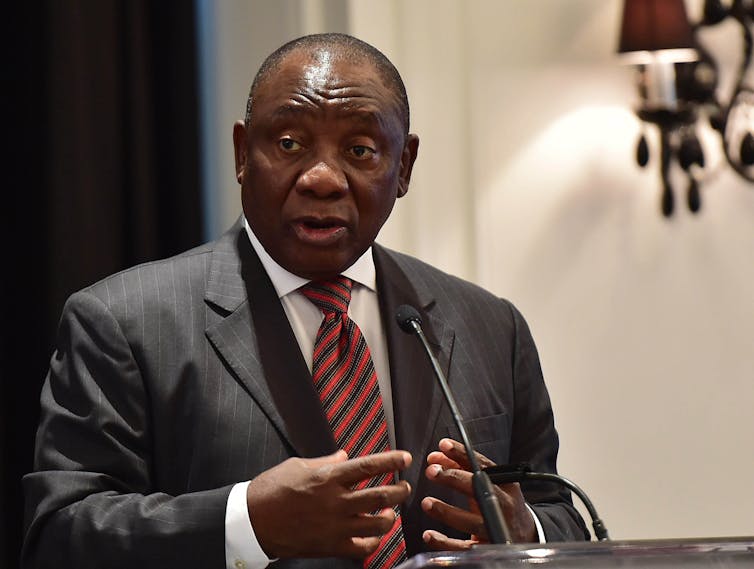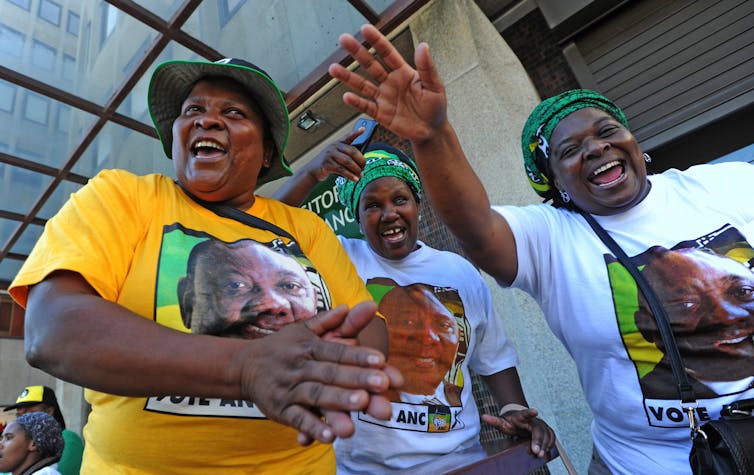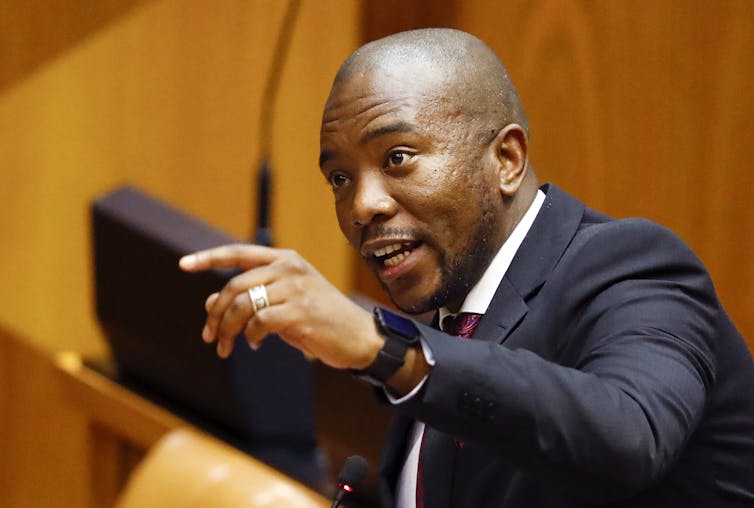
Democratic Alliance leader, Mmusi Maimane is struggling to grow the party further.
EPA/Nic Bothma
After more than two decades in power, South Africa’s ruling party, the African National Congress (ANC) is in severe trouble. The euphoria around the appointment of the new president Cyril Ramaphosa is rapidly fading as he increasingly encounters resistance from within the party to a thorough cleansing of the state.
On top of this the financial crises in key public utilities seem to be getting worse while key economic indicators like unemployment, production and inflation are rapidly deteriorating.
You would think that amid all of this the prospect of the official opposition, the Democratic Alliance (DA), displacing the ANC at the next election would be getting better. But the latest polls indicate that the DA’s support has shrunk since the last election. The party’s prospects of equalling its performance at the last national poll – when it obtained 23% of the national vote – look dim.
What, then, is going on?
There are a whole host of reasons to point to. The first is that Ramaphosa, despite his initial post-Zuma popularity having been punctured, remains a far more impressive and weighty figure than the DA’s leader, Mmusi Maimane.
Part of Maimane’s problem is that DA’s attraction to many has been its claim to represent cleaner and more efficient government. But these claims are being severely tested as it faces the dilemmas and temptations of running the three major metros it took control over after the 2016 local government elections.
It gained control by forging awkward coalitions with the Economic Freedom Fighters (to whose principles it’s bitterly opposed) and other smaller parties. This has meant that its hold on power has often looked fragile, and it’s had to engage in all sorts of wheeler-dealing. Necessary, but not good for the image. Meanwhile, the party allowed its fight with its Cape Town mayor, Patricia De Lille, to drag on for far too long.
And then of course there is the issue of race, which divides the party all the way to the very top.
The DA was founded on principles of liberalism. Its ideological position comes with the assertion that the individual, not the group, is the primary unit of society, and that freedom and equality are realised through the freedom of the individual. That’s not sitting very well within many of its newly found black supporters.
On top of this, the DA’s classic liberalism has run up against the problem of how to address racial disadvantage on an individual basis in a society where fundamental rights and material goods have been allocated by race historically. Either the DA breaches its liberal principles by accepting the need to address racial disadvantage frontally. Or, if it doesn’t, it sends out the message to black voters that it’s not really committed to addressing racial inequality.
This tension played out recently when the party became embroiled in an internal spat over whether or not to support Black Economic Empowerment, an affirmative action policy.
Growth or principles?
Until recently the DA’s share of the vote in the country has increased with every election. That growth came at the cost of having to dilute its core liberal principles, as it sought to expand its appeal beyond its white base to black, coloured and Indian voters.
In 2013 the party accepted that race should become a basis for redress. In 2015, it adopted freedom, fairness and equality of opportunity into its constitution.
Subsequently Maimane has also suggested the party needs to adopt affirmative action by pushing hard for the DA to accept the need for “greater diversity” in its composition. This was a way of saying that more black people are needed in leadership positions without actually using those words.
The more recent internal spat about Black Economic Empowerment also points to these tensions.
Head of policy Gwen Ngwenya announced that the DA has ditched Black Economic Empowerment in favour of real empowerment from the bottom. But many among the party’s newer influx of members realise that they would never be where they are today if it was not for a policy engineered by the ANC – for all its failings.
True, the DA pumps out the message that the children of a black millionaire do not deserve a special hand up from the state. However, without a clearly stated policy about how it is going to pave the way for “equality of opportunity”, it’s going to have to work hard to rid itself of its unwanted reputation of being primarily a party protective of white interests.
Liberalism, conclude many black people, works for white people only.
No easy way out
The problem for the DA is that there is no easy way out of the dilemmas it faces. It comes with the territory of being the major party of opposition and drawing the major body of its support from a white racial minority. Its problem is that on the route to power, principle is always likely to become fudge.
This points to the still greater problem that the DA has to confront (and this is the great unsayable). No opposition party in any country in southern Africa has yet managed to displace a liberation movement. This is despite the fact that the record in government of the region’s liberation movements has been dismal, and the vehicle for the rise of corrupt “party-state” elites. Look no further than Zimbabwe, where in 2008, the opposition Movement for Democratic Change won a parliamentary majority before crashing into the rocks of ZANU-PF intransigence.
The great question which hangs over South African politics is what the ANC would do if it really did lose its majority.
How the DA resolves its dilemmas around race will dictate how it will react in such a situation, for without mass black support it would lack any chance of confronting the ANC were the latter to trash the constitution and maintain its hold on state power.
Roger Southall, Professor of Sociology, University of the Witwatersrand
This article was originally published on The Conversation.
